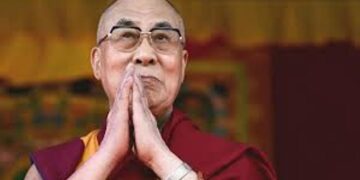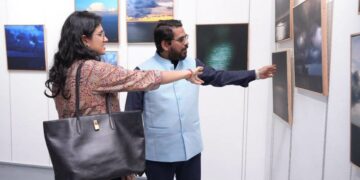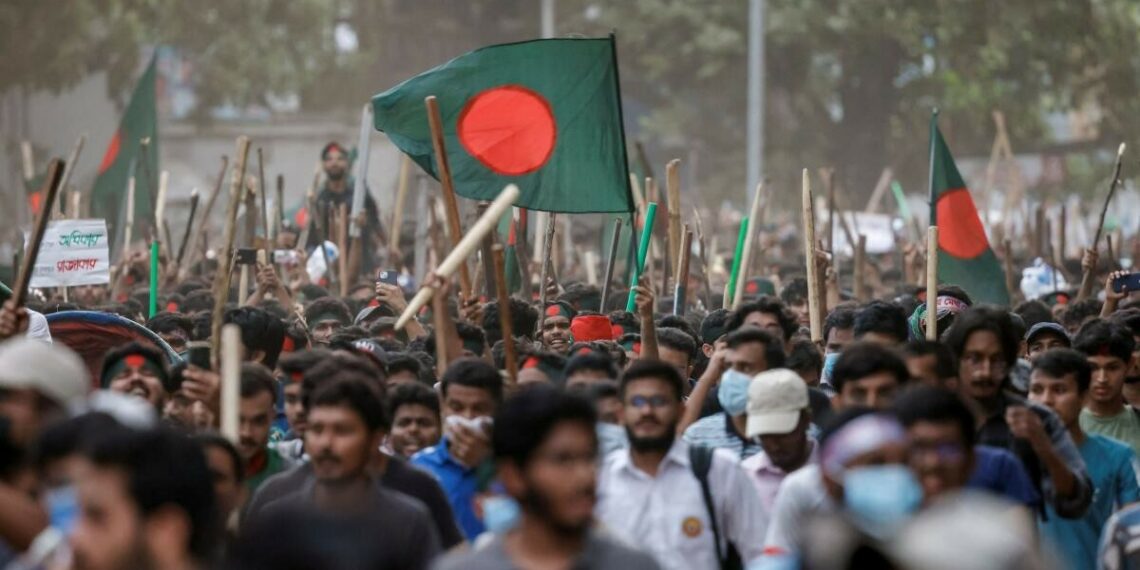Bangladesh is on the brink of political and social collapse, echoing the darkest days of its past. Since the sudden fall of the Sheikh Hasina-led Awami League (AL) government on August 5, 2024, the country has spiralled into chaos.
Rather than a democratic transition, a power vacuum emerged—quickly filled by opportunistic forces, including emboldened Islamists and a complicit opposition. What has followed resembles a slow-moving civil war, marked by political violence, institutional decay, and repression.
This crisis is too deep to be resolved by elections alone. The Bangladesh Nationalist Party (BNP), eager for a shortcut to power, supported the ban on Awami League—despite AL holding over 30% of the electorate.
The Jatiya Party (JP) faces similar threats. Together, these three parties garnered 87% of the vote in 2008. Their exclusion leaves a dangerous void.
Into this vacuum have stepped Islamist forces, primarily Jamaat-e-Islami and the newly formed National Citizen Party (NCP). Though lacking broad public support, they are administratively empowered.
Their electoral strategy, if forced to compete, is to engineer a hung parliament—weakening BNP and expanding Jamaat’s influence. Their ultimate goal is to transform Bangladesh into an Islamic state.
This calculated power grab has ignited a socio-political conflict unlike anything seen since independence. Without a major faction backing down—a prospect that appears unlikely—further violence seems inevitable. The country’s peace and stability hang by a thread.
Rise of the Islamists
The Islamists’ growing boldness stems from two key developments. First, Wahhabi hardliners, comprising about 5% of the population and forming Jamaat’s core, are experiencing unprecedented political legitimacy.
Second, shifting global dynamics work in their favor. With Turkey, Pakistan, and a growing US-Pakistan-Turkey axis emboldening these groups—and amid cooling India-US ties and regional tensions with China—Jamaat sees a rare geopolitical opening.
To capitalize, they’ve intensified efforts to rewrite Bangladesh’s history—specifically the 1971 Liberation War—and undermine the legacy of Mujibur Rahman.
Since India played a pivotal role in the war, Islamists are working to weaken bilateral ties while strengthening connections with Pakistan and Turkey. Undermining India’s eastern flank is a strategic goal.
While the plan isn’t new, its aggressive implementation is. In 1971, Jamaat-led militias (Razakars) targeted Hindus, liberals, and moderate Muslims. Today, similar groups face renewed persecution under new pretenses.
Silencing Dissent
Liberal, pro-Liberation voices are under siege. Exiled bloggers like Elias Hossain and Pinaki Bhattacharya have allegedly led smear and harassment campaigns against such individuals, with apparent tolerance—or complicity—from the Yunus-led caretaker administration.
On August 28, a Dhaka roundtable on Liberation values was violently disrupted. Sixteen participants were arrested under the Anti-Terror Act, including 85-year-old freedom fighter Abdul Latif Siddiqui, Dhaka University professor Sheikh Hafizur Karzan, and popular YouTuber Monjurul Alam Panna.
Once critical of Hasina, Panna turned against the Yunus regime after alleging that the recent protests were part of a “meticulous design” involving terrorist plots against India—claims made just weeks before his arrest.
This was no isolated incident. In July, 71-year-old academic Abul Barkat—renowned for his research on terror financing and minority persecution—was jailed on corruption charges.
On August 7, Professor Nazmul Ahsan Kalimullah, an election expert, was also arrested. Both were vocal critics of the current administration and had been targets of online harassment.
Legal crackdowns have become the norm. Hundreds of judges, lawyers, journalists, and activists have been detained, often denied bail. Legal experts say bail approvals have all but ceased.
BNP’s conduct has worsened the situation. Once a staunch critic of AL, it has now distanced itself from Liberation ideals. The suspension of Fazlur Rahman—a veteran freedom fighter and Hasina critic—for defending the country’s founding values exemplifies this shift.
Mobs, likely inspired by online campaigns, harassed Rahman following his public statements.
Echoes of 1971
Violence is rising sharply. Human rights group ASK reported 441 rape cases between January and June 2025—already surpassing the total for 2024. The use of sexual violence as intimidation mirrors 1971 tactics.
River bodies, those unidentified innocents who have been killed and savagely dumped into rivers, now average 43 recoveries per month—a 20% increase.
As of May, 266 journalists faced criminal charges. ASK documented 196 attacks on media workers in just six months. In August alone, two journalists were killed, and an editor took his own life after being censored by Yunus’s media team.
Minorities, especially Hindus, are under siege. Graphic videos of Hindu women being stripped and raped have surfaced online.
The Yunus administration attributes the targeting to the community’s historic support for Awami League. Most complaints aren’t even filed, let alone investigated.
Sufi Muslims are also at risk. Since July 2024, the government has admitted to at least 84 attacks on Sufi shrines and dargahs.
Some independent counts suggest even higher numbers. In one horrific case, a Sufi saint’s grave was desecrated and his remains burned—mirroring the accusations of “not being Muslim enough” once used by Pakistani forces in 1971.
It is time that this slide into slow moving civil war is stemmed and the values that formed the core of Bangladesh are protected. If timely action is not taken, Bangladesh risks becoming an unstable, low income and radicalised society. A true recipe for disaster.















